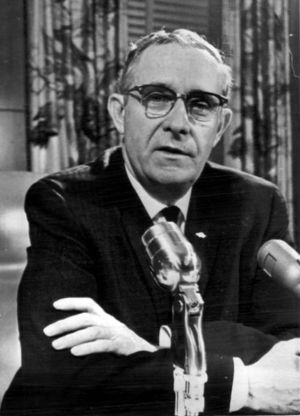1963 Birmingham municipal election
The 1963 Birmingham municipal election was held on March 5, 1963 to elect a mayor and fill nine at-large seats on the newly-approved Birmingham City Council, which replaced the former Birmingham City Commission. It was the first election held after the City of Birmingham adopted the Mayor-Council Act of 1955 as its form of government. Major issues discussed during the run-up to the election included how the city would react to building pressure for desegregation, how to improve municipal finances, and how to polish the city's tarnished national image.
44,736 voters cast ballots on a day marked by storms and high winds, the highest number to ever vote in a municipal election. The bar was raised during the April 2 runoff, when 51,278 people appeared at the polls.
Mayor
Though all three members of the outgoing City Commission refused to leave office and filed suit to keep their positions, two of them, Bull Connor and J. T. Waggoner Sr, qualified for the mayoral ballot. They faced two-term State Senator and then Lieutenant Governor Albert Boutwell, and attorney Tom King.
All four candidates favored proposals to merge Birmingham's outlying suburbs into "One Great City", and all four favored maintaining racial segregation, though they differed in their intended approach. Boutwell and Connor emerged as front runners. Waggoner favored Connor's politics, but without Connor's celebrated viciousness. King, formerly more moderate, had adopted more or less the same platform as the higher-profile Boutwell.
Boutwell promised to mount a vigorous legal challenge to court-ordered integration, while Connor promised outright defiance of federal laws and courts. While Connor would keep pools and playgrounds closed, Boutwell outlined a plan to transfer ownership of public pools to private operators and to establish a reservation system for playgrounds and picnic shelters. On the Birmingham's economic stagnation, Connor applauded City Hall's diminished outlays because it meant low taxes. Boutwell pledged to spur economic development through public improvements and support for the growing Medical Center.
Results
- Albert Boutwell, 17,343 votes (39%), 29,630 votes in runoff (58%), winner
- Bull Connor, 13,780 votes (31%), 21,648 votes in runoff (42%)
- Tom King, 11,650 votes (26%)
- J. T. Waggoner Sr, 1,701 votes (4%)
City Council
Seventy-six individuals filed papers of qualification to appear on the ballot. Thirty-four of the 76 candidates qualified from Birmingham's 10th Precinct (East Birmingham). Seventeen qualified from Precinct 21 (downtown Birmingham); 13 from Precinct 9 (West End), 3 from Precinct 42 (North Birmingham) and one from Precinct 52 (Wylam).
Only two of the qualifying candidates, attorney W. L. Williams Jr and Reverend James L. Ware, were African-American.
Candidates
|
|
Results
Voters were required to select nine candidates at large. Ballots with more or less than nine marks were ruled invalid. The top 18 finishers advanced to the runoff election. In the runoff, the top four vote-getters were awarded four-year terms, with the next five taking two-year terms to establish staggered vacancies in future biennial elections.
- John Bryan, 19,843 votes (44% of ballots), 29,691 votes in runoff (58% of ballots), awarded 4-year term
- M. E. Wiggins, 19,092 votes (43% of ballots), 29,164 votes in runoff (57% of ballots), awarded 4-year term
- Nina Miglionico, 14,962 votes (33% of ballots), 23,100 votes in runoff (51% of ballots), awarded a 2-year term
- George Seibels, 14,426 votes (32% of ballots), 27,400 votes in runoff (53% of ballots), awarded a 4-year term
- Alan Drennen, 12,966 votes (29% of ballots), 25,797 votes in runoff (50% of ballots), awarded a 2-year term
- John Golden, 12,520 votes (28% of ballots), 23,351 votes in runoff (46% of ballots), awarded a 2-year term
- Tom Woods, 11,194 votes (25% of ballots), 24,249 votes in runoff (47% of ballots), awarded a 2-year term
- Frank James, 11,003 votes (25% of ballots), 19,347 votes in runoff (% of ballots)
- Harwell Davis Jr, 10,280 votes (23% of ballots), 19,879 votes in runoff (% of ballots)
- Don Watts, 10,261 votes (23% of ballots), 17,445 votes in runoff (% of ballots)
- W. L. Williams Jr, 9,339 votes (21% of ballots), 8,829 votes in runoff (% of ballots)
- Don Hawkins, 9,211 votes (21% of ballots), 27,540 votes in runoff (54% of ballots), awarded a 4-year term
- Marvin Prude, 9,124 votes (20% of ballots), 21,579 votes in runoff (% of ballots)
- J. L. Ware, 8,722 votes (19% of ballots), 8,698 votes in runoff (% of ballots)
- Warren Crow III, 8,592 votes (19% of ballots), 20,252 votes in runoff (% of ballots)
- Dan Gaylord, 8,137 votes (18% of ballots), 17,692 votes in runoff (% of ballots)
- Bruce Thrasher, 8,108 votes (18% of ballots), 13,937 votes in runoff (% of ballots)
- E. C. Overton, 7,815 votes (17% of ballots), 23,379 votes in runoff (46% of ballots), awarded a 2-year term
E. C. Overton, who barely slipped into the runoff, edging R. R. Andrews by only 19 votes, gained a large amount of support in March, finishing in the top three overall. The two African-American candidates, who finished 11th and 14th in the general election, fell far behind in the runoff as the limits of their support emerged on the smaller ballot. After the newly-elected councilors took office, they elected Wiggins to serve as President of the Council.
References
- Logue, Mickey (February 18, 1963) "76 in race for council's nine seats" Birmingham News - accessed via Birmingham Public Library Digital Collections
- LaMonte, Edward Shannon (1995) Politics and Welfare in Birmingham, 1900—1975. Tuscaloosa: University of Alabama Press ISBN 0817307540
- Kimerling, Solomon P. & Pamela Sterne King (May 10, 2012–October 2013) "No More Bull: Birmingham's Revolution at the Ballot Box" Weld for Birmingham
- Solomon, Jon (February 20, 2013) "Jabo Waggoner: State senator hopes he's half the man his dad was as Birmingham commissioner." The Birmingham News

